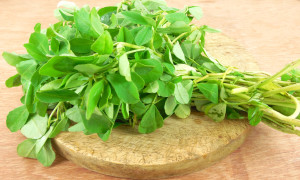Written by Jessica Patella, ND. Thirty postmenopausal women, whose quality of life was decreased due to vaginal atrophy, saw significant improvement of symptoms after just 8 weeks of using a vaginal fennel cream when compared to the control group of women.
 Menopause is medically defined as the cessation of menstruation for one year. The symptoms occurring before menopause vary among women but can result in a decreased quality of life (3). Recent research has found that Fenugreek, a common kitchen spice in India and China, can significantly improve the symptoms of menopause, including quality of life and hormone levels (1).
Menopause is medically defined as the cessation of menstruation for one year. The symptoms occurring before menopause vary among women but can result in a decreased quality of life (3). Recent research has found that Fenugreek, a common kitchen spice in India and China, can significantly improve the symptoms of menopause, including quality of life and hormone levels (1).
The research included 88 postmenopausal women who were randomly assigned to a Fenugreek group (n=44) or placebo group (n=44). They were instructed to take 2 capsules per day (250 mg after breakfast, 250 mg after dinner) for 1 week to adjust for intake, followed by 4 capsules per day (2 X 250mg after breakfast, 2 X 250 mg after dinner) for 12 weeks.
The following results were observed after 12 weeks of supplementation:
| Measurement | Result |
|---|---|
| The Greene Climacteric Scale (measuring the degree the participant experiences postmenopausal symptoms) | Significantly lowered in Fenugreek group compared to placebo after 90 days (19.64 +/- 4.28 vs 30.49 +/- 5.23; p<0.001) |
| Anxiety Scale | Significantly improved in the Fenugreek group by 58.9% compared to baseline and 53.9% compared to placebo (p<0.001) |
| Depression | Significant reduction in the Fenugreek by 47.7% compared to baseline and 50% compared to placebo (p<0.001) |
| Physical and Vasomotor symptoms | Significantly decreased by 47.7% and 49.2% respectively, compared to baseline (p<0.001) |
| Hot Flashes | Decreased by 47.8% in Fenugreek group compared to baseline, with 32% of participants in this group reporting no hot flashes after 12-weeks of supplementation (p<0.001). |
| Vaginal Dryness | Decreased in the Fenugreek group from 42.1% to 18.4% (p<0.001) |
| Irritability | Decreased in the Fenugreek group from 65.8% to 15.8% (p<0.001). |
| Night Sweats | Decreased by 57.1% compared to the placebo group (p<0.001). |
| Mood Swings | Decreased by 68.2% compared to the placebo group (p<0.001) |
| Insomnia | Decreased by 75% compared to the placebo group (p<0.001) |
| Headaches | Decreased by 53.9% compared to the placebo group (p<0.001) |
| Quality of Life | 73% of participants in the Fenugreek group reported an improvement in Quality of Life (p<0.001) |
| Plasma estradiol levels | Increased more than two-fold by 120% in the Fenugreek group, compared with a less than 5% increase in the placebo group (p<0.01) |
Not only do these results show improvement in symptoms with Fenugreek, there was also a significant increase in estradiol levels. Previous studies have shown that when estradiol levels fall below 60 pg/mL menopausal symptoms occur (2). This was the first study of its kind to show that Fenugreek can improve levels of estradiol, which is thought to be why so many of the symptoms also improved in this study (1).
In conclusion, 1000mg of Fenugreek for 90 days improved symptoms of menopause and increased estradiol levels in the participants (1). No adverse side effects were reported in the study. Future research with more participants should be conducted to confirm the results.
Source: Shamshad Begum S, et al. A Novel Extract of Fenugreek Husk (FenuSMART) Alleviates Postmenopausal Symptoms and Helps to Establish the Hormonal Balance: A Randomized, Double-Blind, Placebo-Controlled Study. Phytother Res (2016) DOI:10.1002/ptr.5680
© 2016 John Wiley & Sons, Ltd.
Posted September 27, 2016.
Jessica Patella, ND, is a naturopathic physician specializing in nutrition and homeopathic medicine and offers a holistic approach to health. She earned her ND from Southwest College of Naturopathic Medicine in Tempe, AZ, and is a member of the North Carolina Association of Naturopathic Physicians. Visit her website at www.awarenesswellness.com.
References:
- Shamshad Begum S, et al. A Novel Extract of Fenugreek Husk (FenuSMART) Alleviates Postmenopausal Symptoms and Helps to Establish the Hormonal Balance: A Randomized, Double-Blind, Placebo-Controlled Study. Phytother Res (2016) DOI:10.1002/ptr.5680
- Tepper et al. Trajectory clustering of estradiol and follicle-stimulating hormone during the menopausal transition among women in the Study of Women’s Health across the nation (SWAN) 2012. J Clin Endocrinol Metab 97: 2872-2880.
- Yasui et al. Androgen in postmenopausal women. 2012. J Med Invest 59: 12-27.
